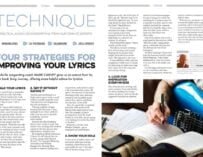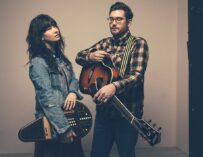
Jane Taylor is an award-winning UK songwriter and songwriting coach
Struggling with writing your lyrics? Award-winning UK singer-songwriter Jane Taylor shares some useful ideas for getting the creative juices flowing
![]() yrics are often an after-thought for some songwriters. Yes, if you can create an interesting and engaging melody you’ll have caught the attention of many listeners. But if you can do that and also hit them with some clever, insightful and evocative lyrics you’ll have turned those listeners into lifelong fans.
yrics are often an after-thought for some songwriters. Yes, if you can create an interesting and engaging melody you’ll have caught the attention of many listeners. But if you can do that and also hit them with some clever, insightful and evocative lyrics you’ll have turned those listeners into lifelong fans.
As a songwriter and a coach to other songwriters, I’m always looking for new and inspirational ways to generate lyrics. Quite often, writers find themselves using similar phrases throughout their songs, or similar themes, or perhaps they always seem to write from the ‘I’ perspective. Sometimes we have a great melody on our hands but draw a blank when we get to thinking about what that song is about. When we’re not quite in the creative zone we might play around with the chords and wait for divine inspiration.
There are, however, quite a number of wonderfully creative ways in which you can kick-start your lyrical mojo. Here are a few of them…
1. The cut-up
Practised by David Bowie when he wrote Ziggy Stardust, Thom Yorke when he penned Kid A and the writer William Burroughs, this is an idea that originated from Dadaism, an avant-garde European art movement from the early 20th Century. Basically, it’s a literary version of the collage technique and is a fantastic way of getting your artistic juices flowing and getting you to ‘play’ with language and ideas (which is always a great thing when it comes to creative lyric writing!)

David Bowie and Radiohead have famously used the cut-up technique
Take a large piece of paper, preferably A1, and start randomly laying out the words in front of you. You don’t have to have them all out at once, maybe a third of what you have. Stand back and have a really good look at the words and start to put words together and see what sort of phrases that creates. Move them around as much as you can, standing back each time to consider what that evokes. For example, here are some I cut up myself: ‘Soldiering on’, ‘Julia’s kitchen’, ‘The disappearing man’, ‘On the corner of the street’, ‘Constantly craving attention’. So I might do this…
‘On the corner of the street,
The disappearing man
Constantly craving attention’
You can add words, you can take them away. There are no rules. It’s really just about ‘playing’ with what’s in front of you. You might find that you take just a few phrases, or even one, and that alone inspires your song. You might write the whole song using the words you’ve collected.
What is lovely about this particular method is that it allows you to physically interact with your lyrics. It also allows you to use words that haven’t been generated initially by your mind (which might write in a particular way), but HOW you put them together and what you chose to do with them is always unique.
2. Hear it, write it!
Another way of playing with language is to sit in a café with a notebook and write down lines that you overhear. People often talk in clichés or sayings and less formal conversation always throws up more interesting phrases. Jot them down. It’s all fuel for your lyric writing!
Keeping a note book with you at all times is a really good way of making sure you gather lyrics wherever you are. You might like a sentence that comes out of a drama on TV or a line someone says on the radio. I heard someone say the other day ‘I was the wrong side of a bottle of red’ and I promptly stored it for future use! The more open your mind is to thinking like a creative writer, the more it will soak up as you begin to realise that the world around you is an endless source of creative inspiration.
3. The mind map
Sometimes we find ourselves halfway through writing a song and realise that it’s not quite working. The chorus doesn’t have the impact, or we struggle with where that second verse is going. Quite often it’s because we haven’t really understood WHAT we’re trying to say. We haven’t worked out what is the most important message and what we want to say to support that message.
It’s a bit like getting up to make a speech without really planning what the point of your speech is, or writing an essay by just putting pen to paper and trusting that your brain will order the points as you go along. Sometimes we can do that because we know exactly what we want to say before we’ve started. But if what you want to say in a song is jumbled in your head, it’s likely to fall out that way in the end too.
Maybe that’s the effect you want, and that will therefore work for you. If it doesn’t, and you want to get clear on where you’re going in your song, then mapping it out can really help. The best way to start to map out your song is to begin with a mind map. A mind map is really just a tool for pinning down everything that comes up when you start brainstorming your song idea.
Put your theme in the middle of a sheet of paper and draw a circle around it. Right down the first things that come to your head when you consider that theme.

Creating a ‘mind map’ can help you marshall your thoughts
As you go along another related theme might come up. Brainstorm that, too, and see where it gets you.
These brainstorms should leave with you a lot of words: some descriptive, some evocative. These words create an initial lyrical landscape. You might decide to pick up an instrument at this point and see what happens. In any case, you’ve taken some of the words that have been in your head and brought them out in front of you so that they’re more accessible.
The next stage is to create a narrative. This will create even more words for you to use when you’re crafting your lyrics and, crucially, will help you to understand what you’re trying to write about.
4. The narrative and finding your chorus
Once you’ve got a few brainstormed mind maps, start to write a short narrative about your theme. Write a short story of no more than a page of A4 about your subject. It could just be a paragraph but when you feel like you’ve reached the ‘point’ of your story, that’s when you stop. The narrative will help you create the story and the story will end when you get to the point. It’s the punchline of a joke or the most important thing you discovered from that story: ‘And because all of that happened I realised this’. The point of your narrative could also be the ‘hook’ and what your chorus is about.
5. Mapping out your song
Once you have got this far you’ll have lots of words to play with. And with an idea of what’s going on in your chorus, you can start to consider what might be going on in your verses, because these will set up and support your theme. Under the headings ‘Chorus’ ‘Verse 1’ and ‘Verse 2’, start to place words and phrases from your mind map and your narrative into those sections of your song. I mind-mapped a song idea I had about a friendship that broke down
Chorus
Old friends
Photographs
Getting to see our lives unfold
Sharing our stories and memories
Laughing
Souls connected
Friends that would last
Childhood friends
Verse
The house where you used to live
The wall that fell down in the garden
The rain
The card with yellow flowers on the wall
Silence left
Broken chair
You telling me what you thought of our friendship
Verse
My friends patched me up
I have support and love from other friends
But none of them knew me like you did
None of them went back so far and had so much shared memories.
I don’t quite get what happened.
Chorus 2
We built a city. We knew each other so long and so well.
It was solid and had life spilling out
Bridges castles cathedrals history shared, birds flying over the city
Ancient streets
Fallen city, crumbled ruin, lost old friends
Once you have words mapped out into areas, you need to decide on a time signature. I chose 6/8. Choosing a time signature really helps when it comes to shaping your lyrics: ideally your lyrics should hang on that time signature really tightly so that you can rap it without a melody.
So this what I ended up with:
Old Friends by Jane Taylor
V1
In the house where you lived
Where the wall in the garden’s fallen down
Well something had to give
Mmm
V2
Yellow flowers in a frame
Tell the tale we don’t like to think about
Not even your name
And all this rain…
V3
And left on a chair
There’s a memory I don’t talk about
Your silence lives there
Bridge
And all this rain
This rain
Chorus 1
Sometimes
I can remember that we smiled
Laughing through photographs
Two souls
I’ll be with you till the end
Quietly watching the years go by
Old friends
V4
In the life that you left
There’s a tear that we’ve patched up perfectly
Keep catching this thread
Bridge
And oh my faith
You test
My faith
It’s in shreds
Chorus 2
Life spilled
Over the city that we built
Bridges and castles cathedrals
History we knew so well
And here’s to the tale of the old friends
And the city that crumbled and fell
Old friends
Old friends
Old friends
 Jane Taylor is an award-winning singer-songwriter who’s opened for Jools Holland, Paolo Nutini and Seth Lakeman, recorded with Massive Attack guitarist Angelo Bruschini, and performed sessions on BBC Radio 2 and 4. For more on Jane and her music, see www.janetaylor.co.uk
Jane Taylor is an award-winning singer-songwriter who’s opened for Jools Holland, Paolo Nutini and Seth Lakeman, recorded with Massive Attack guitarist Angelo Bruschini, and performed sessions on BBC Radio 2 and 4. For more on Jane and her music, see www.janetaylor.co.uk
When not writing and performing, Jane also coaches songwriters from all over the UK and runs The Art Of The Song, a series of unique and inspirational courses for all songwriters whatever their experience. Some are residential and set in an 18th Century farmhouse, some are day courses run from her home. The next course takes place on 25 and 26 April in Frome, Somerset. You can book for one or both days, at a cost of £100 per day. For more information, see www.theartofthesong.co.uk.




































I’ve attended one of Jane’s song-writing workshops;it was an awesome experience!
I’ve only been writing for about 3-4 years, but I had already got myself into a bit of a ‘same-old same-old’ kinda place. I figured the workshop would just build upon what I already knew…. but it achieved so much more than that!;It’s definitely opened up my writing and melody style in ways I could not have imagined.
Jane’s approach is a bit like someone coming into the place you have been living in for twenty odd years and showing you a doorway under the stairs that you have never seen before. You open it up and it is a whole new room in your home that you never knew existed, but yet was always there. I’ve been writing like mad since I got back… Finishing projects started on the course and starting some new ones that have just come from somewhere. A brand new way to appreciate what you didn’t know you had.
I’ve got 7-8 pieces of work on the go since Jane’s workshop (some collaborations) I’m calling the collection ‘Discovering The Doorway’ because that’s what she helped me do. So… Thank you Jane and…Kudos to you.
Hello Jane
My name is Karen and I am a 53 years old, so may be a bit old for starting this course. I just write lyrics for fun to already established songs and that I have about 43 on my laptop with another 7 half done. I also have a to do list of around 40 topics, to do at leisure. My friends and family love to read them and i was greatly encouraged by their enthusiasm. I don’t consider myself a songwriter in any shape or form, but I would love to be able to write a song from scratch just for my own personal satisfaction. My favourite songwriter has always been Gilbert O Sullivan and I went to see him in Cheltenham last month, he is still writing fabulous songs. Also Carol Bayer Sager and Lennon/McCartney songs are very inspiring. Am I too old to do this course? Is it just for people in the music industry or who would like to be in the music industry? I hope to hear from you soon. Have a good week in this lovely sunshine.
Many thanks
Karen Stott
Hello Jane
My name is Karen
I was just looking at your website and wondering if your song writing course would be suitable for me. I am 53 years old and I write lyrics for established songs just for pleasure. I have about 43 songs already on my laptop and about 7 still half finished. I also have a list of around 40 other topics on my to do list. It is a hobby that I have grown to love and my friends and family often sing the songs and we have get togethers just to sing and have a good laugh. I would like to see if I could challenge myself and write a song from scratch without relying on other songs to get me through. Would your course be suitable for someone like me who just would like to do it for my own satisfaction of rising to a personal challenge? Have a good evening.
Many thanks
Karen Stott